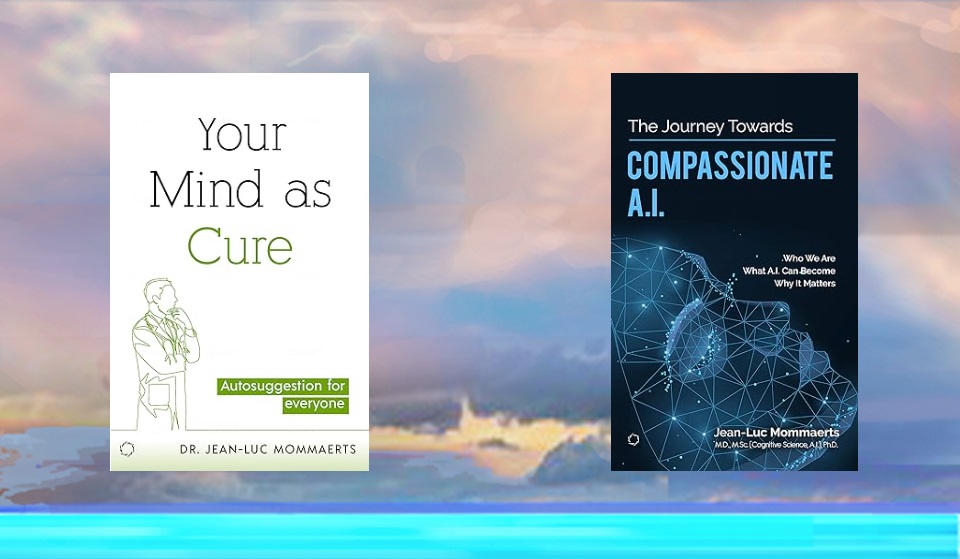Power of Placebo < Autosuggestion

The placebo effect is well known, but not well understood. Many explanations have been suggested, including belief, hope, classical conditioning, expectation, endorphins, and the meaning response. All boil down to autosuggestion , in the sense of ‘communication with the nonconscious’.
[Note that I published about this myself in a high-level medical scientific journal: Mommaerts JL, Devroey D. The placebo effect: how the subconscious fits in. Perspect Biol Med. 2012 Winter;55(1):43-58. doi: 10.1353/pbm.2012.0005. PMID: 22643715.]
An important implication of this
is that the placebo effect can in principle be used effectively without the placebo itself, through a direct use of autosuggestion.
The benefits of such a strategy are clear: fewer side effects from medications, huge cost savings, no deception of patients, relief of burden on the physician’s time, and healing in domains where medication or other therapies are problematic.
In view of the fact that almost any health problem can be influenced through the placebo effect, this opens up huge possibilities.
A much-cited definition of placebo (from Shapiro and Shapiro – 1997 *):
“any therapy (or that component of any therapy) that is intentionally or knowingly used for its nonspecific, psychological, or psychophysiological, therapeutic effect, or that is used for a presumed specific therapeutic effect on a patient, symptom, or illness but is without specific activity for the condition being treated” (p. 41).
The placebo effect may be seen as the primary and non-discernible effect on a person brought about by using a placebo, which is in itself inert regarding this very effect or part of it. It is what happens in time between the contact with the placebo and the physiological/psychological consequences of the placebo effect. There is no clear dividing line between the effect and the consequences. However, using the term placebo effect puts emphasis on how an external event (such as the taking of a drug) gets translated into a discernible internal event (such as feeling better or the lowering of blood pressure).
Difference between placebo and autosuggestion
Looking closely at the above definition, for placebo to work, one has to close down on truth. Contrary to this, for autosuggestion to work, one has to open up to truth. Which is what the whole AURELIS project is about.
In the end, only truth can truly cure.
Generally, placebo explanations that one finds in the literature don’t take into account non-conscious mental processing. Autosuggestion is about taking non-conscious processing into account. This in fact is a very important part of true human being. [see: “The Modern Subconscious” / “The Subconscious in Action”] In other words, the non-conscious is part of our ‘truth’, without which we cannot get properly cured in many cases.
Let’s now take a deeper look into the 5 placebo explanations that are most prominent in the medical literature. These mechanisms overlap to a huge degree, which in itself already points to a probably parsimonious explanation.
Hope/belief
When looked upon from a neurophysiological perspective, not hope/belief as such, but deep, true hope/belief, touching one’s inner self, has an effect, this is: when it becomes autosuggestion. One cannot purely consciously decide to have true hope, belief, or expectation, just as one cannot consciously and effectively wish oneself into getting better through a placebo pill or procedure. In this hypothetical case, the placebo pill would even be senseless.
Instead, placebo works through the non-conscious being appealed to – be it, in the case of placebo, in a covert way.
Classical conditioning
is the pairing of an unconditioned stimulus (UCS, such as food to a dog) with a conditioned stimulus (CS, such as the ringing of a bell) until the CS elicits the same response (saliva flowing) as the UCS.
Probably the first to investigate a conditioned placebo effect from drugs was Pavlov (the one of the dogs). He reported that effects from morphine injections occurred in conditioned animals already when he was preparing the injections or when he placed the dogs in the experimental chamber where they had previously received morphine.
The classical conditioning model traditionally bypasses any reference to the non-conscious being more complex than just a set of simple reflexes. Complex meaning at non-conscious level is, however, always important in situations of classical conditioning. [see also: “What Did Pavlov’s Dogs Know?”]
Expectation
Most authors agree that expectation can be very powerful. It can even override pharmacological effects, so that expectancies contrary to the pharmacological effect of a drug can in some cases prevail over the drug’s effect itself.
Even so, the word ‘expectation’ is frequently used as if only conscious expectation is meant — this is, what one can consciously put into words and communicate in a formal way. To assess conscious expectation, one can simply ask the subjects of an experiment before it begins.
Expectation is thus mostly seen as a kind of ‘conscious belief.’ However, it is clear that conscious expectation alone cannot have a placebogenic effect. Expectation does not operate on a conscious level. One cannot even simply consciously decide to have an expectation, nor even heighten or lower it.
The depth of your expectation – whether it deeply touches you, whether it moves your ‘heart’ or ‘soul’ – is the main factor of effectiveness. If you consciously have an expectation but at the same time you do not have that expectation deep inside, then it will hardly have any effect.
Interestingly, expectation also plays a big role in the effectiveness of psychotherapy.
Some authors see the modulation of endorphins in a placebo setting as an ‘explanation’ or ‘mechanism’ of the placebo effect. But what then causes the change in endorphins? In fact, this change is itself the consequence of the placebo effect: it is proof that such consequences can be material, but it is not an explanation.
From another viewpoint, one could say that the change in endorphins is part of the placebo effect, with body and mind acting as one: no cause and effect involved, since there is no time lapse in between, any ‘movement of mind’ being at the same time a ‘movement of body.’
In the domain of pain, lots of research points to the same conclusion: placebo conditions can show large reductions in pain and in brain activation within pain-related regions (including endorphin secreting ones). In any case, although such bodily changes are sometimes used in order to explain the placebo itself, they actually do not explain but merely point to the huge complexity of mind-body unity.
Meaning can be something that one looks up in a dictionary, but this is not what is meant here. Something gets a ‘deeper meaning’ when it touches you deeply, and in the case of emotions it may prone to change your physiology (as in blushing or changes in blood pressure).
A placebo provokes a meaning response, like a key in a slot. Before the placebo turns up, meaning in the sense of the ability to respond to something meaningful is already non-consciously present, and so is the power of this meaning. The placebo only serves to awaken what is already there.
The ‘deeper’ the meaning response goes, the better it reaches the non-conscious, thus the more it is a genuine kind of autosuggestion.
-> Autosuggestion
A lot of mental processing happens beyond the level of conscious processing. A good example of this is vision. [see: “The Modern Subconscious”]
Autosuggestion is about (deep meaning’ – this is, how one becomes deeply touched by something. Imagine your dearest pet dies and you are deeply touched. Tears come up, sadness, mourning. Your body reacts to your grief in different ways. How does this come about? How does one become “deeply touched”? This death awakens something inside you. It is like a very complex key. Autosuggestion is the enactment of such keys, verbally or nonverbally, which can provoke feelings or other alterations in body and mind.
One cannot consciously decide to have less pain. The effect of consciously wanting it is nil. It has to reach one’s non-conscious, or deeper mind, where it can be transformed into action. The pattern “I expect this medication to relieve my pain” means that taking this medication ‘communicates’ to ‘me’ that my pain will be relieved. The placebo effect is proof that our deeper minds are capable of many very complex things and of a kind of purpose.
Autosuggestion in this sense brings together the placebo effect that we see in almost all regular and alternative medicine’s medications and actions, psychotherapy, “miracle cures,” and hypnosis. It is a concept and domain that one can communicate about, investigate, ameliorate, and make practically available.
Is Placebo Justified Deception?
Many doctors dislike the idea of placebo and like to discuss it even less. However, it is important to engage with this practice that is still very much among us, because some real dangers stem from the deceptiveness of placebos. [see: “Placebo Is Not Good for You”] Moreover, a firm notion of ‘informed consent” actually precludes placebo: strictly speaking, prescribing a placebo is increasingly impossible without breaking the law.
Vertosick (**) warns: “If our patients can’t imagine a good result, they won’t experience a good result” (p. 269). We should therefore strive to make use of the placebo effect in a completely open manner.
Conclusion
The different explanations of the ubiquitous placebo effect eventually boil down to a covert kind of communication to the nonconscious. Thus, we may have to rethink much of modern regular medicine. Straightforward autosuggestion as overt communication to the non-conscious should be at the center. This means that we may have to ‘deepen’ our science.
At stake are health and well-being of all.
(*) Shapiro, A. K., and E. Shapiro. 1997. The powerful placebo. Baltimore: Johns Hopkins Univ. Press.
(**) Vertosick, F. T. 2000. Why we hurt. Orlando: Harcourt.


